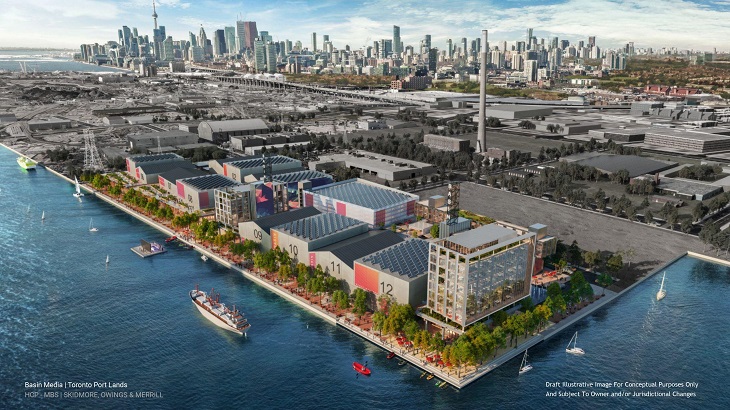
TORONTO — With production volume in Toronto on track to hit a record high in 2022, the screen industry is driving “record expansion” in the city, including the growth of studio space, enhanced workforce development initiatives and the creation of environmentally friendly production amenities, according to a press release issued today by the City of Toronto.
“Toronto’s screen production industry continues to see extraordinary growth, with an international audience recognizing the skills and abilities of Toronto talent. The fact that we are on track to break the $2.2 billion production volume record set in 2019 as early as next year is a clear sign that Toronto and its screen industry is coming back stronger than ever,” said Toronto mayor John Tory in the press release.
Yesterday, Mayor Tory announced Hackman Capital Partners and its affiliate The MBS Group had been chosen by the city to build and operate a new $250-million film and TV studio complex on 8.9 acres in Toronto’s Port Lands area. The so-called Basin Media Hub (pictured above is an artist rendering of the proposed development) will consist of up to 500,000 square feet of studio space and production offices, including eight purpose-built sound stages, and workshop and production support space.
“The City’s decision to put a City-owned, 8.9-acre parcel of land on the market for studio development recognizes the economic and cultural value of the screen sector and acknowledges that the global demand for space in Toronto surpasses current capacity,” the press release reads.
The city says it expects this demand for Toronto studio space and talent to increase. Its expectation is based in part on several recent industry successes, including Netflix opening a Canadian headquarters in Toronto in 2021, Amazon Studios growing its investments in the city, as well as investments by leading companies in “ascendant technologies” that are positioning Toronto as a global leader in virtual production and content creation workflow innovation.
Successful series such as Star Trek: Discovery, See, Locke & Key, Schitt’s Creek, What We Do in the Shadows, The Queen’s Gambit, Jack Reacher and the upcoming feature films Nightmare Alley and Women Talking were all made in Toronto, the city’s press release notes.
“By 2025, through expansions and new builds, studio space in the Toronto region will increase by 63 per cent, to a projected 5.3 million square feet,” the release says.
The City of Toronto and its Film Office work closely with industry partners and the Toronto Film, Television and Digital Media Board to attract more investment and produce more jobs.
“In September, the City announced the expansion of xoTO Screen Industry Pathways, the Film Office’s workforce development initiatives to grow and diversify the talent pool in Toronto alongside unions and guilds, training community groups and educational institutions,” says the release.
The city’s workforce development activities are guided by the Toronto Screen Industry Workforce Study, which identified labour gaps and benchmarked workforce growth relative to increasing studio space.
“The approach is threefold: to educate Torontonians about the many career options in the sector; to create low-barrier training programs that fast-track diverse youth into union or guild membership; and to assist productions in tapping into new talent.”
Toronto is addressing demand for environmentally friendly production amenities by building its first two “power drops” at high-usage locations, “enabling productions to plug in to electrical power rather than utilizing diesel generators,” the release explains.
According to the press release, the two power drops will reduce the production industry’s carbon footprint by 400 tons of green house gases per year, “which is the equivalent to the energy use of 45 homes or 81 driven cars per year.”
The city says it will build more power drops in the coming years as industry demand requires.
Finally, the city’s Film Office is responding to industry growth by hiring additional film permit coordinators and sector development staff to innovate and expand services as production volumes grow. The city is introducing new film permitting fees in 2022 to help support the Film Office and its workforce development and sustainability initiatives, the release says.
For more, please click here.
Artist rendering of the Basin Media Hub borrowed from the City of Toronto’s website.


